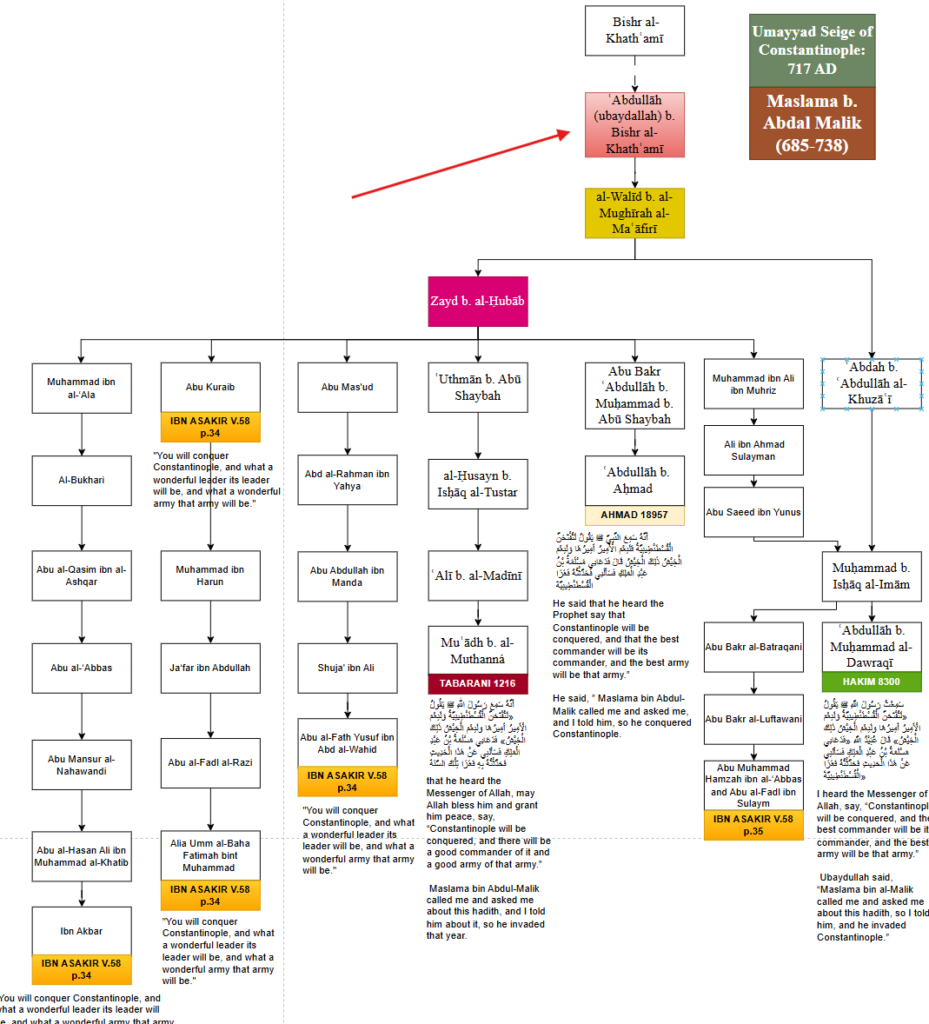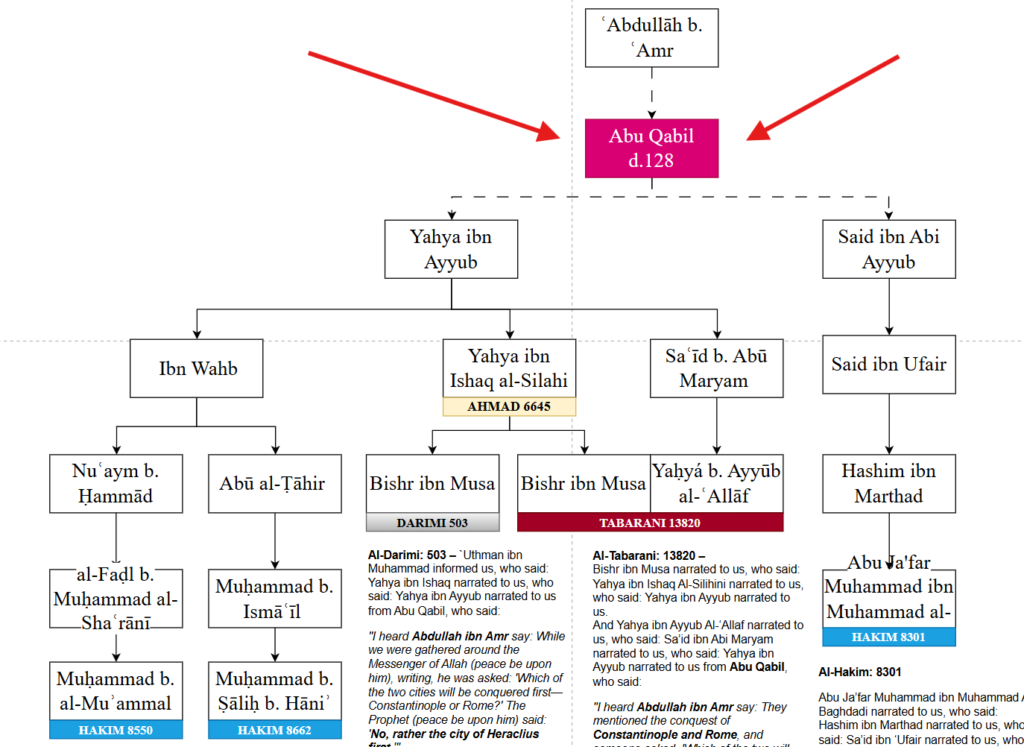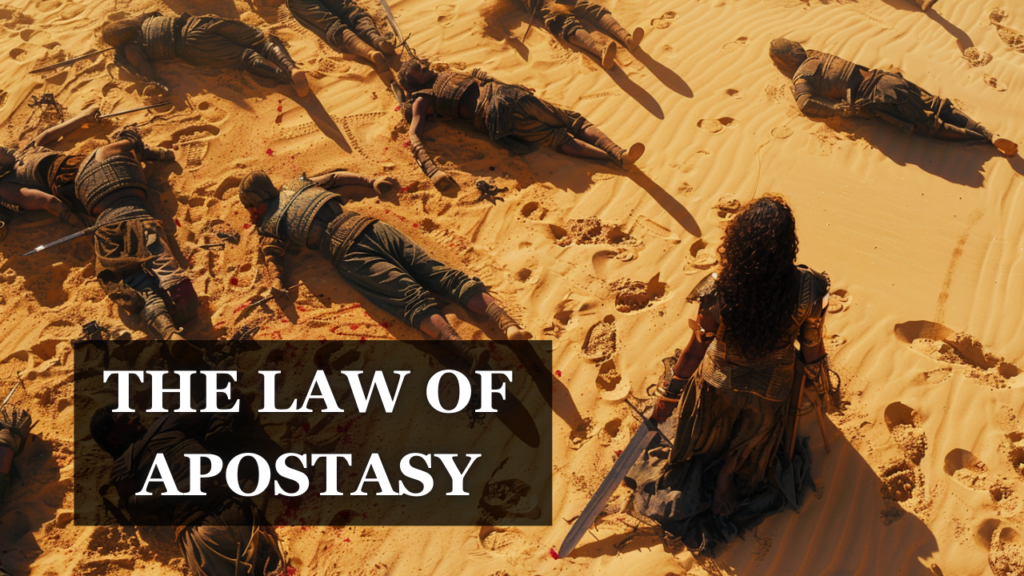Hadith 1: YOU WILL CONQUER CONSTANTINOPLE + AMAZING LEADER
There’s a famous hadith that predicts: “You will definitely conquer Constantinople. The leader who conquers it will be amazing, and their army will be amazing too.” For centuries, many Muslims have believed this prophecy was fulfilled when Sultan Mehmed II captured Constantinople in 1453. However, when we dig deeper into the history, some interesting questions come up.
He said that he heard the Prophet say that Constantinople will be conquered, and that the best commander will be its commander, and the best army will be that army.”
He said, “Maslama bin Abdul-Malik called me and asked me, and I told him, so he conquered Constantinople.”
- AHMAD 18957
The Prophecy: A Historical Examination
First, the timing is suspicious. This hadith first appears during a failed attempt to capture Constantinople in 717 CE – centuries before Mehmed II succeeded. A general named Maslamah was leading an army to attack the city and specifically asked to hear this “prophecy” before his campaign. This makes historians wonder: Was this saying created to motivate Maslamah’s army rather than being a genuine prophecy? The chain of narration (isnad) of this hadith involves several figures, notably Ubaydullah ibn Bishr. Historical records suggest that Ubaydullah narrated this hadith to Maslamah ibn Abd al-Malik. This connection raises questions about the hadith’s authenticity, suggesting it may have been fabricated to motivate the Umayyad army during their campaign against the Byzantine capital.

“I heard the Messenger of Allah ﷺ say: ‘You will surely conquer Constantinople, and what a wonderful leader its leader will be, and what a wonderful army that army will be.'”
ʿUbaydullāh said: “Maslama ibn ʿAbd al-Malik summoned me and asked me about this hadith, so I narrated it to him, and he [then] went on to lead an expedition against Constantinople.“
This is a hadith with a sound chain of transmission, and neither [al-Bukhari nor Muslim] included it in their collections.
—Authentic (according to al-Dhahabi)
Analyzing Mehmed II’s Leadership
There’s also the character of Mehmed II himself in 1453 that we can’t ignore. If this prophecy was really about him being a “wonderful leader,” you might expect him to be known for wisdom and compassion. Instead, historical records show a more complicated picture. While Mehmed was certainly a brilliant military commander, he was also quite ruthless. For example, he made it legal to kill royal family members to prevent power struggles – and even had his own infant brother killed. This seems to go against Islamic teachings about protecting human life.

The reliability of the saying itself is questionable. While some respected Islamic scholars considered it authentic, it’s notably absent from the two most trusted collections of Islamic sayings (Bukhari and Muslim). This is like if a supposedly important historical document was missing from major archives – it raises some red flags.
The Umayyad Connection and Political Motivations
The bigger picture here seems to be about politics and motivation. The rulers of the time (the Umayyad dynasty) really wanted to capture Constantinople. Having a “prophecy” saying they would succeed would have been very useful for boosting army morale and convincing people to support their military campaigns. Later, after Mehmed II actually conquered Constantinople, people naturally connected this old saying to his victory. But just because the prediction came true doesn’t necessarily mean it was a genuine prophecy from the beginning.

The isnad of the hadith traces back to Ubaidullah ibn Bishr, who relayed it during a time of Umayyad ambition for territorial expansion. This connection indicates that the hadith may have been crafted to legitimize military endeavors and inspire confidence in the army, despite the historical outcome being a failed siege.
Counterarguments and Alternative Perspectives
Despite the evidence suggesting fabrication, some argue for the hadith’s authenticity, citing its transmission through reputable collectors like Al-Dhahabi and its inclusion in various Islamic texts. However, the absence of the hadith in the collections of Al-Bukhari and Muslim, two of the most authoritative hadith compilers, raises doubts about its credibility. Moreover, the narrative linking the hadith to Mehmed II gained prominence during the Ottoman era, which may have further solidified its association with the successful conquest. Yet, this retrospective application does not necessarily validate the prophecy’s authenticity but rather reflects the political and cultural interests of the time.
Conclusion
Rather than being a straightforward prediction that came true, it looks like this saying might have started as a way to motivate soldiers during an earlier failed attempt to capture the city. The fact that Constantinople was eventually conquered by Mehmed II – albeit centuries later and by a leader whose actions often conflicted with Islamic principles – made people connect the dots after the fact.

More Information:
Hadith 2: YOU WILL FIGHT THE ROMANS + TAKE CONSTANTINOPLE WITH TASBIH & TAKBIR
tabarani:14157 – Muḥammad b. ʿAbdūs b. Kāmil al-Sarrāj > Muḥammad b. Isḥāq al-Musayyibī > ʿAbdullāh b. Nāfiʿ > Kathīr b. ʿAbdullāh b. ʿAmr from his father from his grandfather
[Machine] The Prophet ﷺ said to Ali ibn Abi Talib, “You will fight the yellow people with a group of Muslims who will not blame them for the sake of Allah until you conquer Constantinople with takbir and tasbih.”
One of these variants appears in the Kutub al-Sittah, specifically in Sunan Ibn Majah #4094. The muhaddithun have graded it da’if (weak). Additional variants are found in al-Tabarani’s al-Mu’jam al-Kabir #14157, #14158, and #14138 (you listed 14138 twice), as well as in al-Hakim’s al-Mustadrak #8448. All of these variants are built upon the testimony of a single narrator: Kathir ibn Abdullah ibn Amr ibn Awf al-Muzani.

The ‘ilm al-rijal on this individual notes: Kathir ibn Abdullah ibn Amr ibn Awf lied about his father and grandfather, despite his grandfather being a companion.
| Scholar | Criticism | Citation |
|---|---|---|
| Abu Hatim al-Razi | “He is not reliable.” | al-Jarh wa al-Ta’dil (7/154), Tahdhib al-Kamal (24/136), Tahdhib al-Tahdhib (3/462) |
| Abu Dawood al-Sijistani | “He was one of the liars.” / “He is a liar.” | Tahdhib al-Kamal (24/136), Tahdhib al-Tahdhib (3/462), al-Kashif fi Ma’rifat Man Lahu Riwaya fi al-Kutub al-Sittah (4/60) |
| Abu Zar’ah al-Razi | “He has weak narrations and is not strong.” Prefers Bahz and Abd al-Muhmin over him. | Tahdhib al-Tahdhib (3/462), al-Jarh wa al-Ta’dil (7/154), Tahdhib al-Kamal (24/136) |
| Ahmad ibn Hanbal | “Rejected his hadith in the Musnad and did not narrate from him.” / “He is a fabricator, not credible.” | Tahdhib al-Kamal (24/136), Tahdhib al-Tahdhib (3/462), al-Jarh wa al-Ta’dil (7/154) |
| Abu Khaythama | “Do not narrate from him.” | al-Kamil fi al-Du’afa (7/185), Tahdhib al-Kamal (24/136), Tahdhib al-Tahdhib (3/462) |
| Al-Fasawi | “Weak in narrations.” / “Some exaggerated by attributing him to lying.” | Tahdhib al-Tahdhib (3/462), Taqrib al-Tahdhib (1/808) |
| Al-Dhahabi | “He is a liar.” | al-Kashif fi Ma’rifat Man Lahu Riwaya fi al-Kutub al-Sittah (4/60) |
| Al-Nasa’i | “Abandoned in narrations.” / “He is not trustworthy.” | al-Kamil fi al-Du’afa (7/185), Tahdhib al-Kamal (24/136), Tahdhib al-Tahdhib (3/462) |
| Ali ibn al-Madini | “Weakened him.” | Tahdhib al-Tahdhib (3/462) |
| Muhammad ibn Sa’d | “Narrated few hadiths and was considered weak.” | Tahdhib al-Tahdhib (3/462) |
| Yahya ibn Ma’in | “Not credible.” / “Weak.” / “Had a companion grandfather, but he himself was weak.“ | al-Kamil fi al-Du’afa (7/185), Tahdhib al-Kamal (24/136) |
| Ibn Hibban | “He narrated a fabricated version from his father and grandfather. It should not be mentioned in books or narrated except as an extraordinary case.” | Tahdhib al-Tahdhib (3/462), Tahdhib al-Kamal (24/136) |
| Ibn al-Sakan | “He narrates from his father and grandfather some hadiths that contain doubts.” | Tahdhib al-Tahdhib (3/462) |
| Ibrahim ibn al-Mundhir | “A person of much disputation. None of our companions would take hadith from him.“ | Tahdhib al-Tahdhib (3/462), Tahdhib al-Kamal (24/136) |
| Al-Mutarrif ibn Abdullah ibn Mutarrif | “A person of much disputation, with no purpose.” | Tahdhib al-Kamal (24/136) |
Kathir ibn Abdullah ibn Amr ibn Awf al-Muzani.
Kathir ibn Abdullah is considered a highly problematic narrator by classical hadith scholars:
- Imam al-Shafi’i described him as one of the “pillars of falsehood“
- Imam Ahmad ibn Hanbal said about him: “His hadiths are munkar (rejected)“
- Yahya ibn Ma’in graded him as “not trustworthy“
- Abu Dawud stated that “he is matruk (abandoned)“
- Al-Bukhari noted that he was “munkar al-hadith“
What makes this case particularly problematic is that Kathir ibn Abdullah was known to fabricate hadiths and attribute them to his father and grandfather, despite his grandfather being a companion. This exact pattern is present in this hadith – he claims to narrate it through his father and grandfather in an attempt to establish a connection to the Prophet. Given that these narrations are built entirely upon Kathir ibn Abdullah’s testimony, and considering his established status as an unreliable transmitter who fabricated chains through his family members, all of these variants are to be rejected.
Hadith 3: CONSTANTINOPLE, THEN ROME
darimi:503 – ʿUthmān b. Muḥammad > Yaḥyá b. Isḥāq > Yaḥyá b. Ayyūb > Abū Qabīl > ʿAbdullāh b. ʿAmr
[Machine] “While we were around the Messenger of Allah ﷺ writing, the Messenger of Allah ﷺ was asked, ‘Which two cities will be opened first, Constantinople or Rome?’ The Prophet ﷺ replied, ‘No, the city of Heraclius (Constantinople) will be opened first.’”
At its heart, we have a prophecy about Constantinople’s conquest that traces back to Abu Qabil, a scholar who lived during a pivotal moment in Islamic history. He died in 128 AH, which placed him right in the midst of the Umayyad dynasty’s ambitious military campaigns, including their famous failed siege of Constantinople in 717 CE.

Imagine being Abu Qabil, living through a time when the mighty Umayyad army faced a devastating defeat at Constantinople’s walls. The morale would have been low, and the military needed something to keep soldiers motivated for future campaigns. This is where our story takes an intriguing turn – we see a hadith emerge, supposedly from the Prophet Muhammad, specifically predicting that Constantinople (referred to as “the city of Heraclius”) would be conquered before Rome. This is a similar case to Hadith #1 we analyzed earlier. The timing and circumstances are telling. Consider how useful such a prophecy would be for military commanders trying to rally troops for another attempt at Constantinople. By claiming this conquest was divinely predicted, it could help maintain morale despite recent failures. The hadith’s specific mention of “the city of Heraclius” being conquered before Rome shows a level of detail that often suggests someone writing with knowledge of current events rather than recording a genuine prophecy.
What makes this analysis more compelling is that by the time the 717 siege had failed, this hadith was already circulating widely in scholarly circles. Once religious traditions begin spreading, they take on a life of their own. It’s like trying to put toothpaste back in the tube – nearly impossible to retract once it’s out there. Abu Qabil’s position as the common link in all the transmission chains of this hadith, combined with his historical context, suggests we’re looking at an attempt to engage in political propaganda to assist the Umayyad government. (It should also be noted that Rome has never been seized by a Muslim army as the hadith suggests would occur).
وينقل النووي عن القاضي عياض قوله عن ظاهرة تضخم الحديث والكذب فيه: “الكاذبون ضربان: أحدهما ضرب عرفوا بالكذب وهم أنواع، منهم مّن يضع ما لم يقله النبي استخفافاً كالزنادقة، وإما تديّناً كجهلة المتعبدين الذين وضعوا الأحاديث في الفضائل والرغائب، وإما إغراباً وسمعةً كفسق المحدثين، وإما تعصباً واحتجاجاً كدعاة المبتدعة ومتعصبي المذاهب، وإما إتباعاً لهوى أهل الدنيا والعذر لهم. ومنهم مَن يضع للمتن الضعيف إسناداً قوياً، ومنهم مَن يدّعي سماع ما لم يسمع منه، ولقاء مَن لم يلتقِه، ومنهم مَن ينسب كلام الصحابة وحكم العرب للنبي
Translation:
[Imam] Al-Nawawi quotes Qadi Ayyad as saying about the phenomenon of hadith amplification and lying: “Liars are of two kinds: One of them is those who put what the Prophet did not say as a mockery, such as the heretics, or religiously, such as the ignorant worshippers who put hadiths in virtues and desires, or out of curiosity and reputation, such as the debauchery of the modernists, or out of fanaticism and argumentation, such as the preachers of heterodoxy and the fanatics of sects, or following the whims of the worldly people and excusing them. Some of them claim to hear what they did not hear and meet those they did not meet, and some of them attribute the words of the companions and the wisdom of the Arabs to the Prophet.


Pingback: Flogging, Torture, and Transmission of Hadith - HadithCritic